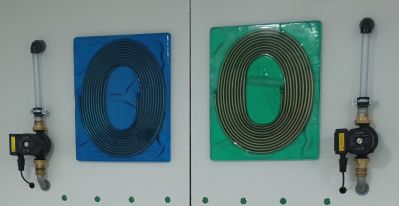Are antifreeze valves essential for a glycol free ASHP system?
@editor My criteria would be more system volume (how much would be needed (whole system fill or only to a internal plate), exposure (wind chill, geographic location) likelihood of re-pressurising and maintenance of AFV (sourcing anti-vacuum and sensor cartridges can be difficult, can compensator tubes be used?
Options are just that, if your only tool is a hammer, every screw is a nail.
Posted by: @david-i@abernyte Difficult to get specific figures but I work on
Water 4.184kj/kg.K.
Monopropylene glycol 3.884kj/kg.K (@30%)
Monoethylene glycol 3.712kj/kg.K. (@30%)
Pump at say 50W will cost 1p/hour to run, with glycol added 1.1p/hr.
This is correct but you have not calculated the pumping requirements correctly. You have forgotten the increase in viscosity of the glycol mixture. At 40 Deg C, Glycols viscosity is around 3 cST, 3 times that of water. The higher viscosity makes it harder to pump and creates more friction, therefore a higher head requirement from the pump.
If you take an 8 Kw heat pump, which requires around 1.5 m3/hr flow, and considering most units have a 25-8 pump internally, at this flow, you will get in the region of 5 meters pressure, but after the unit between 3.5 and 4 meters pressure will be available for the system. Using the Grundfos online pumping calculator, to achieve this you will need approximately 45 watts of power.
If you add glycol at 30%, you will increase the pumping requirement to about 1.68 m3/hr due to the lower thermal capacity, and increase the head requirement to about 7.5 meters due to the extra friction losses. To achieve this, using the same calculator will require close to 130 watts of power.
Therefore, adding glycol will increase the pumping power requirement by approximately 3 times, but that is not the mane problem, most installers do not recognize this phenomenon and do not increase the pump size or capacity, therefore, the pump in the unit, which the system was designed for, will move significantly less water than required, then a system separator in installed with all the associated losses, and the normal 6-8m head pump installed to supply the system, again significantly undersized.
Hence, the claim that glycol will reduce system performance by 20%+
In the training centre I have just built, we tackle exactly this, I have built a test rig that actually shows the difference in power needed to transfer glycol compared to water. This rig shows, in real time, live, to move the same amount of energy needs 3 times as much power. These 2 units are exactly the same, the pumps, pump the liquid through 10m of 10mm microbore to create some friction. The pressure, friction loss, flow and power consumed are measured for comparison.
Thank you for this comprehensive reply, it is quite the eye opener! Can I just confirm something please, mostly as I don't seem to experience this level of increased cost in the real world application of using my system?
I get the quantifiable increase in the costs of power used by the pump from 1.35p/hr to 3.9p/hr, however it is the next paragraph where all of the increase in costs or accrued losses are assumed and not quantified. These may or not get anywhere near the eye popping 20 plus percent energy increase. Are we saying that all systems that use glycol are going to run at a penalty of 20 plus percent increase in costs as a result?
I had the opportunity to revert my system to running on water only for around a month while a building alteration was carried out. When it was refilled with glycol the energy use increase was of the order of 5 percent. I realise many other factors could play on this change but it was more inline with the general expectation.
I also note your test system is using 10mm piping. Would it not be nearer to real world heat pump installation if 15/22mm piping was used for radiators or 16mm for underfloor heating, or is the test system designed that way for a different purpose?
@abernyte It very much depends on how your system is designed and operated. The poorer the system and SCOP the less effect glycol has on the overall performance.
I do not know what your system performance is or how your system is designed, however, when we remove the glycol and correct the system design and operation, we see savings of up to 70% with better comfort levels.
Thank you for the explanation, you’re absolutely correct, it’s not a phenomenon I’ve encountered, thanks again. Your experience is invaluable; without intending contradiction I looked again at the machines I deal with which are fitted with 25-9 pumps up to 10kW with residual head over 8m. Up to 16kW the same residual head.
In light of that @10kW I’d be looking at around 1.93m/hr with 6m head available, something that might be worked with. At 16kW 3.03m/hr with 3m head though that would be a different system arrangement.
At maximum power the cost of the pump running currently I calculate at 3p/hour (whenever the pump is at max.). If I assume 120 days continual operation at maximum and 4 hours/ day the balance of the year that would total 23160 hours. The additional electrical cost if the installation lasted 20 years would be £250 or 24p/week.
This is almost pie-in-the-sky speculation but I would be interested in your thoughts and corrections.
This is all something I need to factor into calculations.
Posted by: @allyfishAnti-freeze valves should be on both outdoor unit supply and return pipes at the lowest point.
@allyfish What is the rationale for your requirement to fit anti-freeze valves on both supply and return pipes? This is contrary to what @heacol recommends. If a single valve operates to reduce the pressure in the system to zero, won't this prevent expansion damage everywhere in the system?
I think that the anti-freeze valves are designed to drain all the water from the system. Any valves can only do so if all the water can actually drain to the location of the valves.
I suspect the main item to protect would be the plate heat exchanger (evaporator), which could be ruptured either internally, externally, or both, and could possibly allow the refrigerant gas to leak to the atmosphere.
I think for the price of an extra anti-freeze valve it would be better to be safe than sorry.
- 27 Forums
- 2,520 Topics
- 58.6 K Posts
- 488 Online
- 6,800 Members
Join Us!
Worth Watching
Latest Posts
-

Out of interest, why did you buy the Aerona 3 R32, rath...
By GrahamF , 28 minutes ago
-
RE: Heat Pump vs New Gas Boiler for Inherited House - Worth the Extra Cost?
Hi @fretless6 Mike, I have experience with Taggas (Re...
By Old_Scientist , 1 hour ago
-
RE: Peak Energy Products V therm 16kW unit heat pump not reaching flow temperature
Hi @bobflux thanks for pointing out the difference in t...
By DaveC , 1 hour ago
-
RE: Daikin Altherma 3 LT compressor longevity question
@bobflux With my limited HA skills I can't ad...
By Ubert767 , 2 hours ago
-

RE: Underfloor Heating Installation Issues with Heat Pump
I'm going to install Thermacome ACOSI+ radiant ceiling....
By bobflux , 4 hours ago
-
RE: Testing new controls/monitoring for Midea Clone ASHP
Now seems a good time to summarise the costs and effici...
By benson , 6 hours ago
-

RE: Tell us about your Solar (PV) setup
@mk4 Charge to 100%, discharge down to 10%.
By bobflux , 7 hours ago
-
RE: Connecting Growatt SPH5000 over wired ethernet rather than wireless
The simplest wired option is usually the Growatt Ethern...
By Jonatan , 12 hours ago
-

RE: Electricity price predictions
@jamespa And it seems some of the nasty public cloud...
By Batpred , 19 hours ago
-

RE: Jokes and fun posts about heat pumps and renewables
Technology is rapidly advancing. BBC News reported th...
By Transparent , 23 hours ago
-

What matters for flow and pressure drop is internal dia...
By bobflux , 23 hours ago
-

RE: Do Fridges and Freezers have COP ratings?
@editor Thank you all for your replies and submitted in...
By Toodles , 1 day ago
-

I know and yes. The secondary deltaT wont necessaril...
By JamesPa , 1 day ago
-

RE: Designing heating system with air to water heat pump in France, near Lyon
Just love the way you put it! 🤣
By Batpred , 2 days ago
-

RE: Safety update; RCBOs supplying inverters or storage batteries
Thank you for sharing. So it seems that your Schneid...
By Batpred , 2 days ago
-

RE: Forum updates, announcements & issues
@upnorthandpersonal thanks for the thoughtful, consider...
By Mars , 2 days ago
-

RE: Solar Power Output – Let’s Compare Generation Figures
@mk4 All 21 panels have their own Enphase IQ7a microinv...
By Toodles , 2 days ago
-
RE: Setback savings - fact or fiction?
Great, so you have proven that MELCloud is consistently...
By RobS , 3 days ago
-
RE: Mitsu PUHZ120Y 'Outdoor Temp 'error?
Thanks David & James It almos...
By DavidAlgarve , 3 days ago
-

RE: Surge protection devices SPDs
@trebor12345 - your original Topic about the right type...
By Transparent , 3 days ago
-

RE: Help needed with Samsung AE120RXYDEG
@tomf I’ve been sent this from a service engineer at Sa...
By Mars , 3 days ago
-

RE: Buying large amp bidirectional RCD and RCBO
Yes... I went through this particular headache and ende...
By bobflux , 4 days ago
-

O-oh! Let's take this as an opportunity to 'pass the ...
By Transparent , 4 days ago




